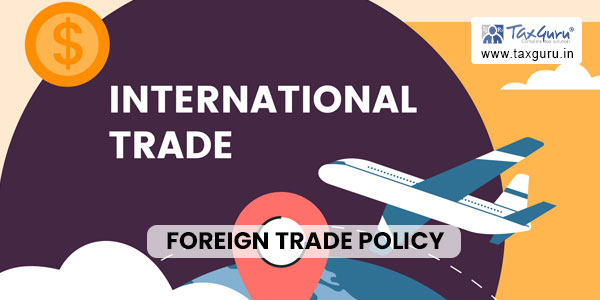Introduction
Foreign trade policy are a set of guidelines and instructions which are established by Directorate General of Foreign Trade (DGFT) related to import and export of goods in India. This is announced after every 5 years. It creates various expectations for exporters, traders and manufacturers.
Minister of Commerce and Industry, Piyush Goyal unveiled the new Foreign Trade Policy 2023 on 31 March, 2023. Let us know in brief about the incentives proposed to be given by this new policy and the future effects which are expected from them in the coming years.
Special features of Foreign Trade Policy 2023 (FTP 2023)
1. The policy has been made dynamic i.e. will change as per need of the hour as and when it will be needed.
2. This dynamic feature has broken the ongoing tradition of earlier Foreign trade policies which was earlier made for 5 years.
3. Long term excellence and productivity is the motto of this new policy.
4. Ease of doing business for MSME’s by reduction of fees to attain various government schemes related to foreign trade.
5. Automation of system for taking trade approvals
6. The approach of this policy has been shifted from incentive to remission.
7. Department of Commerce to be restructured based on future needs.
8. Collective approach of incentives to be adopted by states and districts
9. Various beneficial schemes for manufacturers, traders, exporters, technology sector.
Incentives to be introduced by FTP 2023
1. Amnesty scheme to be proposed for earlier default in export obligations.
2. Faridabad, Mirzapur, Moradabad and Varanasi declared as towns of export excellence.
3. Consultation mechanism would be introduced to resolve trade related queries.
4. Applications would be digitized under the new policy and merchant trading provisions introduced.
5. E-commerce export hubs to be started.
6. Ease of recognition norms for recognition as Star trading houses.
7. Remission scheme to be introduced for duties, taxes and government lies.
8. Time of taking advance authorization reduced to 1 day.
9. Faster resolution of trade disputes would be in place excluding fraud related investigation cases
10. Value limit of exports increased from Rs. 5 lakh to Rs. 10 lakh per consignment through courier service.
11. Export of dual use items under Special Chemicals, Organisms, Materials, Equipment and Technologies (SCOMET) Policy to be streamlined
12. More states and districts to be engaged through Export hubs initiatives

13. Incentives for specific sectors-
- Special Advance Authorization scheme now extended to Clothing and Apparel sector
- Reduced obligations for vertical farming equipment, green hydrogen and battery electric vehicles under Export Promotion Capital Goods Scheme (EPCG)
- Dairy sector exempted from maintaining average export obligation
- Vertical farming equipment, Wastewater treatment and recycling, rainwater harvesting system, Rainwater filters, green hydrogen and battery electric vehicles added to green technology products
- PM Mega Integrated textile region and apparel parks additional scheme would be provided under Common Service Providers (CSP)
14.Export promotion would be promoted in districts by following means :
- Preparing, Monitoring, implementing District Export Action Plans
- A collaborative approach involving all districts to be made for export promotion
- Services Export Promotion Council and Districts Export Promotion Council to be constituted for export promotion in districts and states
- District Export Action Plans to be prepared for each district.
Expected Future Consequences
1. Ease of doing business for traders and exporters.
2. E-commerce exports would grow to USD 200-300 billion by 2030.
3. Allowing international trade settlement in domestic currency.
4. Indian rupee will be made a Global currency as trades would be promoted more in Indian currency.
5. It is expected that overall exports would increase from $676 billion in FY 2022 to $770 billion in FY 2023.
6. Exports would get a boost in the coming months
7. International exports to reach US$ 2 trillion by 2030





